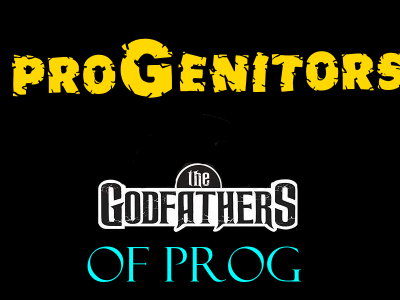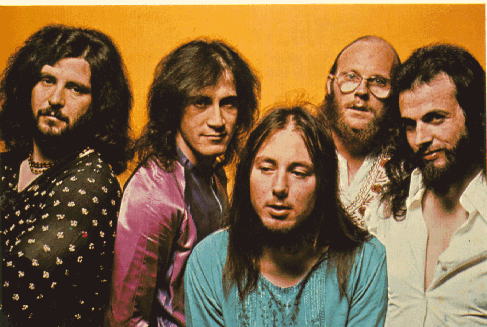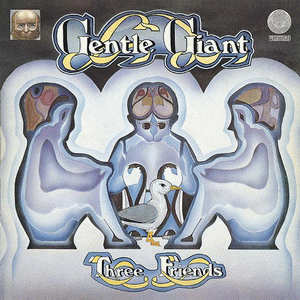We will of course be getting back to the timeline presently, but I'd just like to diverge slightly from the laid down path, stop and take a breath, and pay tribute to the bands and artistes that did so much for progressive rock, some of whom are rightly lauded, some of whom are not, but all of whom are what I would definitely class as

The first guys I want to look at probably fit more into the latter category, and personally I know little about them, and have heard I think one album (though that will of course change as we move along the timeline), but they are certainly recognised to be a large part of the progressive rock movement overall.


With a name like that, if you don't know them, you'd probably think they were a folk band, quite low key and laidback, relaxed sort of chaps. You might be interested to hear that although yes, they did incorporate folk music in their sound, they also used soul, jazz and classical elements, and over their ten-year career they produced no less than eleven albums. Perhaps one of the only prog rock bands to not only contain, but be founded by, three brothers, Gentle Giant was Derek and Ray Shulman, and their younger brother Ray. Perhaps not too oddly, but still interesting, the first two were born in Scotland (Glasgow) while Ray did not arrive until the family had moved to Portsmouth, perhaps as far from his brothers' birthplace as it is possible to get and yet remain on the mainland of Britain, and so would be technically English while his siblings were Scottish.
With a musical family background, the boys were all encouraged from a young age to learn whatever instruments they could, with the result that the three of them grew to be multi-instrumentalists, again something of a rarity in a family, but certainly good groundwork for their later ventures into progressive rock. Originally though – and again almost uniquely – they were a soul/pop band which turned to psychedelia as that became popular and actually had a top ten hit single. Instead of capitalising on that though, the brothers hated the new sound their record company was pushing them towards and dissolved the band, and after a short stint as another band called The Moles, they eventually decided to create and found Gentle Giant.
The oddities with these guys continue. With three of them in the new band they hired three more bandmembers, two of which were ... wait for it ... multi-instrumentalists too! These were Gary Green and Kerry Minnear, and drummer Martin Smith. He wasn't a multi-instrumentalist. How left out he must have felt! Not to mention that the newly-formed band now had three lead vocalists – Derek and Phil Shulman and recently-joined Kerry Minnear – and even two of the remaining six members also sang on occasion. Gentle Giant released their first, self-titled album in 1970 (which we will be looking at soon), a relatively short affair with only seven tracks and clocking in at just over a half hour in total.

Less than a year later they were back with their second, much more experimental album, which contained their “mission statement”:
”It is our goal to expand the frontiers of contemporary popular music at the risk of being unpopular.” Their, even for prog rock, eclectic approach to the subject matter for their songs was evident in their usage of the writings of a French Renaissance humanist in one of the songs. The album, again, was short, just over half an hour with this time eight songs.

The title may have been quite appropriate, as it was certainly not to everyone's taste, and in what was becoming, and would become, the standard for prog rock bands in the seventies, their third album was a concept. Even at that, it was short and had again only six tracks. It would appear Gentle Giant were not eager to follow the likes of Yes and ELP with side-long compositions and multi-part suites.

Nevertheless, that same year they released their fourth album,
Octopus, which is generally regarded as one of their best works. Sadly, during the tour to promote the album Phil Shulman left the band, and the remaining band members carried on to release their fifth album, 1973's
In a Glass House, another concept, followed by yet another concept album,
The Power and the Glory in 1974, which is generally rated as a favourite among fans but which of course did nothing commercially, and also led to them changing labels, to move to Chrysalis Records, with whom they spent the rest of their career.

The first album released on the Chrysalis label was the more accessible, almost commercial
Free Hand, which even scraped into the top fifty in the US, followed by the weird
In'terview in 1976, a concept album based on the idea of an actual interview (not surprisingly, that bombed and failed to capitalise on their recent mini-success in the States). Although their albums were not exactly shifting platinum or gold units, Gentle Giant did become famous for their incredibly versatile onstage musical prowess, and their fame spread that way, but soon the advent of punk would make its mark upon the world, and Gentle Giant found their eclectic and energetic music no longer appealed to the general populace. They retreated into a sort of semi-pop style, as both 1977's
The Missing Piece and 1978's all-out pop
Giant for a Day!. Their final album, 1980's
Civilian maybe says it best with its title: after trying to live up to their grandiose statement on their second album, Gentle Giant had slowly succumbed to the pressure of commercialism and the changing attitudes towards music as the 1970s became the 1980s, and finally retired after their eleventh album.

Perhaps one of the great “could-have-been” stories of the prog rock movement, Gentle Giant typified a band who started off with lofty ideals, tried to remain true to them despite little real commercial success or recognition, and eventually gave it up as a bad job. We'll be sampling all of their catalogue (or most of it, depending on the years and what was released) as the timeline goes on, so I can't speak to whether or not they deserved to be bigger, or it was right that they faded away, but whatever the truth is, it's a pity they didn't make it as they seemed to be genuine musicians with a genuine desire to entertain and please.
Unfortunately, as bands like Genesis, Yes and Rush learned, sometimes that just isn't enough.